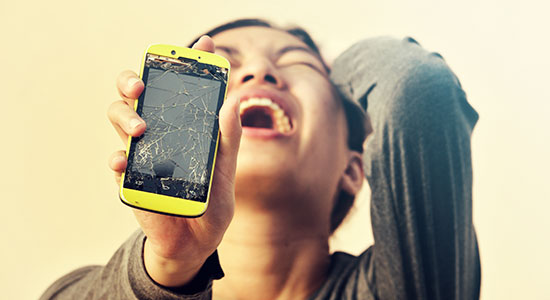
I was out to breakfast recently with my family, including my active 2-1/2-year-old daughter. As I got her settled in her chair, I pulled out her crayons, coloring books, and assorted toys, trying to decide what she might want to eat. We looked around the colorfully decorated room, shaped like an igloo, and Lucy immediately noticed the green tinsel hanging from the windows. We talked about all the various decorations for another 10 minutes – the kid notices everything!
As my eyes scanned the room, I noticed something eerily quiet in the corner – a family of four in silence, each person focused on some type of screen. I watched them on and off throughout breakfast, and not once did they look at each other, only at their screens, and eventually at the meals placed in front of them.
People on Phones are Everywhere
This type of scene plays out for many folks in many restaurants on many nights. Last week I gave a presentation in Utah, and I decided to grab a bite to eat when I was done. I sat in the bar area next to a couple who spent more than 30 minutes without talking to each other, again focused on their phones.
 Paula Davis-Laack, Marquette 2002, MAPP, is the founder of the Stress & Resilience Institute, a training and consulting firm focused on enhancing resilience, well-being, and engagement in the legal profession. She is the author of the e-book, Addicted to Busy: Your Blueprint for Burnout Prevention.
Paula Davis-Laack, Marquette 2002, MAPP, is the founder of the Stress & Resilience Institute, a training and consulting firm focused on enhancing resilience, well-being, and engagement in the legal profession. She is the author of the e-book, Addicted to Busy: Your Blueprint for Burnout Prevention.
Screen time has become our default. Waiting for your flight? Pull out your phone. Waiting for your friends to arrive and feeling bored? Look at your phone. Not enough excitement in the meeting you’re attending? Reach for your phone.
In response, Cal Newport, author and professor of computer science at Georgetown, hopes to usher in a new era called Digital Minimalism, a philosophy of technology use in which you focus your online time in a small number of carefully selected activities that strongly support the things you value.1
When I talk to lawyers about the challenges they face in the profession today, without question one of the biggest issues they cite is technology. New technologies are revolutionizing the profession, but lawyers complain more about the fact that they just can’t get away from technology. They wait for the email from a client at 2 a.m., fearful that a delayed response will look bad.
Effects of Being Hooked on Technology
In his wonderful book Irresistible, Adam Alter, a professor at New York University’s Stern School of Business, summarizes the research about the irresistible urge to use technology and the businesses that spend millions of dollars to keep you hooked. Guidelines suggest that people should spend less than one hour per day on their phones, yet research shows that only 12 percent of phone users meet that criteria – that means 88 percent of people overuse, with the overall average being three hours.2 Alter goes on to detail a survey of young adults that revealed that 46 percent of them said they would rather break a bone than break their phone – and many of the 54 percent who said they’d rather have a broken phone agonized about that decision.3
A survey of young adults
revealed that 46 percent
of them said they would
rather break a bone than
break their phone – and
many of the 54 percent
who said they’d rather
have a broken phone
agonized about that
decision.
Email is one of the biggest job demands (aspects of your work that take consistent effort and energy) busy professionals have today, and I consistently hear this from attendees at my presentations about burnout at work. According to one survey, “almost one-third of U.S. workers report replying within 15 minutes of receiving a work email, and more than three-fourths reply within an hour.”4
When you are at work, constantly toggling between checking email and doing other work activities taxes your mental and emotional capacities. The very act of switching between tasks takes mental effort, which in turn limits your cognitive capacity and the result is more distraction and stress.5 In addition, frequent multitasking often results in worse performance across all tasks and can compromise emotional well-being, leading to less positivity.6
One study measured two groups of people – one group was asked to check their email frequently throughout the day, while the other group was asked to check it only three times per day. They found that the group who chunked their email checking had lower levels of tension and overall day-to-day stress. As a result, the lower levels of stress translated into higher levels of mindfulness, self-perceived productivity, and better sleep.7
Tips for Dialing Down
Try setting aside a dedicated chunk of time several times each day when you do nothing but answer email. Once that time is up, move on to something else. I started doing this when I’m in my office, and it has helped my concentration immensely (especially when it comes to focused tasks such as writing this article).
Lawyers beware – it is seductive to think that we have to check our email constantly, just in case there might be an emergency. We have been conditioned to think everything is urgent and that something urgent is always lurking around the corner.
In addition to chunking your email checking, here are three other strategies to try.
The very act of switching between tasks takes mental effort, which in turn limits your cognitive capacity and the result is more distraction and stress.
Download the Moment App. If you’re really interested in tracking how much time you spend on your phone, download an app called Moment. Most people underestimate their phone usage by about 50 percent. Not all phone use is created equal – Moment actually stops tracking the time if you’re using your phone to make a call or listen to music.
Use the “Butt-brush” Effect. The “butt-brush” effect is an example of a stopping rule – a cue in your environment that gets you to stop something. In the 1990s, psychologist Paco Underhill was asked by store owners to help them identify why people suddenly stopped shopping. Underhill noticed that when strangers brushed up against each other, they left the store. The shoppers couldn’t explain their behavior, but the “butt brush” served as a cue to stop shopping and move onto something else.8 What is a cue you can use to stop scrolling through social media, for example?
Try Breaking the Habit. This may be hard, but there is a specific process you can use. In his phenomenal book The Power of Habit, Charles Duhigg summarizes the research surrounding how habits are formed (and broken). Habits are created via a three-part loop – a cue, a routine, and a reward (or payoff). If you want to break a habit, the trick is to keep the cue and the reward the same but change the routine.9
If you want to break a habit, the trick is to keep the cue and the reward the same but change the routine.
For example, if you want to break the habit of mindlessly checking your phone, figure out your habit loop: I get bored (the cue), start checking fantasy football scores (the routine), then my body relaxes (the reward). Now change the routine: when you get bored, instead of reaching for your phone, read a book or magazine, crochet, or make dinner.
Conclusion
Technology isn’t going away, and when used correctly, it has the ability to make our lives easier and support the values we hold dear. It’s important for us to make sure we’re using it to its highest and best use.
Endnotes
1 Newport has a new book coming out in February 2019, and I first read about it on the wonderful blog Barking Up the Wrong Tree, by Eric Barker. Barker’s summary of Newport’s upcoming book.
2 Adam Alter, Irresistible: The Rise of Addictive Technology and the Business of Keeping Us Hooked 15 (New York, NY: Penguin Press 2017).
3 Id.
4 Kostadin Kushlev & Elizabeth W. Dunn, Checking Email Less Frequently Reduces Stress, 43 Computers in Hum. Behav. 220-28 (2015).
5 For a summary of studies talking about mental load, distraction, and email, see id. at 221.
6 Id.
7 Supra note 4 at 226.
8 Supra note 2 at 183-85. See also Paco Underhill, Why We Buy: The Science of Shopping (New York, NY: Simon and Schuster, 1999).
9 Charles Duhigg, The Power of Habit: Why We Do What We Do In Life and Business 46-52, 63-73 (New York, NY: Random House, 2012).
